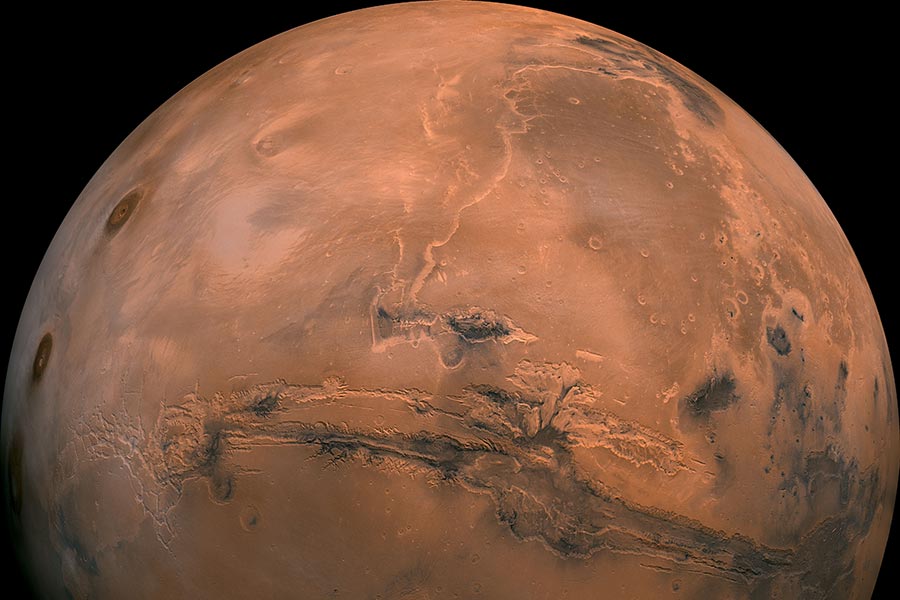
- Mars may have lost much of its ancient water not to space but to a vast underground reservoir buried 3.4 to 5 miles beneath its surface.
- NASA’s InSight lander detected seismic evidence of a water-rich layer, suggesting liquid water is trapped in porous rock like a saturated sponge.
- This hidden ocean could cover Mars in an ocean 1,700 to 2,560 feet deep if brought to the surface, rivaling Earth’s Antarctic ice sheet.
- The discovery raises questions about potential microbial life and could be a critical resource for future human missions to Mars.
- Future missions with advanced sensors and drills are needed to confirm the presence of water across the planet and unlock more of Mars’ secrets.
For decades, scientists have puzzled over the fate of Mars’ ancient water. Once a world of flowing rivers and deep lakes, the Red Planet now appears as a barren desert. But new research suggests that much of its "missing" water didn’t vanish into space; it may be locked deep underground in a vast, hidden ocean.
Published on April 25 in the journal National Science Review, the study reveals seismic evidence of a liquid water layer buried 3.4 to 5 miles beneath Mars’ surface. This discovery, made using data from NASA’s InSight lander, could explain where billions of gallons of water disappeared as Mars transitioned from a wet world to the dry planet we see today.
The mystery of Mars’ missing water
Mars wasn’t always the frozen wasteland it is now. Between 4.1 billion and 3 billion years ago, the planet was rich with water, carving valleys, deltas, and sedimentary layers. But as its magnetic field weakened and its atmosphere thinned, surface water began to disappear. Some escaped into space, some froze into polar ice caps, and some became trapped in minerals.
Yet these processes couldn’t account for all the water Mars once held. "This conundrum has long puzzled scientists," researchers noted, leaving a gap in our understanding of the planet’s hydrological history. The new study suggests the answer lies deep underground.
Seismic clues point to a water-rich layer
NASA’s InSight lander, which touched down on Mars in 2018, provided crucial data by recording seismic waves from marsquakes and meteorite impacts. When researchers analyzed these vibrations, they detected a "low-velocity layer" where seismic waves slowed significantly, a telltale sign of liquid water trapped in porous rock.
"This 'low-velocity layer' is most likely highly porous rock filled with liquid water, like a saturated sponge," explained study co-authors Hrvoje Tkal?i? of the Australian National University and Weijia Sun of the Chinese Academy of Sciences. "Something like Earth’s aquifers, where groundwater seeps into rock pores."
The volume of this hidden water is staggering. If extracted, it could cover the entire planet in an ocean 1,700 to 2,560 feet deep, making it roughly equivalent to the water locked in Antarctica’s ice sheet.
Why this discovery matters
Liquid water is a cornerstone of life as we know it. If Mars harbors vast underground reservoirs, it raises tantalizing questions about the potential for microbial life — or even remnants of ancient ecosystems — surviving in these depths.
Beyond astrobiology, this water could be a vital resource for future human missions. "Purified, it could provide drinking water, oxygen, or fuel for rockets," researchers noted. However, drilling miles into Mars’ crust remains a formidable challenge.
What’s next?
While the findings are groundbreaking, they are based on data from a single region near Mars’ equator. Confirming the presence of water across the planet will require more seismic studies, possibly from future missions equipped with advanced sensors.
"Future missions with seismometers and drills are needed to confirm the presence of the water at these depths and gather more clues," Tkal?i? said. Until then, the discovery offers a compelling answer to one of Mars’ greatest mysteries and a new reason to keep exploring.
For now, the Red Planet’s secrets remain locked beneath its dusty surface, waiting to be uncovered.
Sources for this article include:

Comments